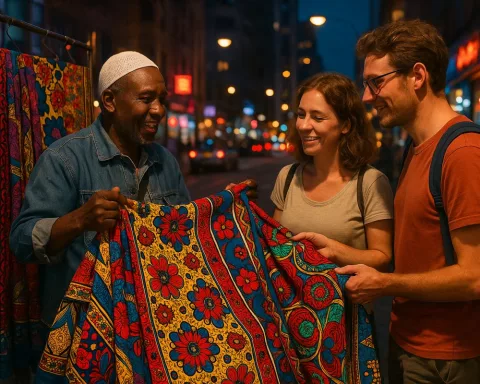Churches in Cape Town are facing an alarming surge in thefts, with robbers targeting worshippers and their belongings, raising concerns about the motives behind the crimes. The South African Council of Churches recognises the vulnerability of these historically revered spaces and is concerned about their susceptibility as soft targets for crime. The challenge for churches now is how to ensure the safety of churchgoers while maintaining the spiritual principles of openness and accessibility.
The Disturbing Wave of Robberies
Churches in Cape Town have been experiencing a surge of thefts, with armed robbers targeting worshippers and their belongings. The vulnerability of these historically revered spaces has been recognized by the South African Council of Churches, and concerns have been raised about the motives behind the crimes, with some suggesting that offerings may be the target. While churches are grappling with how to enhance security without compromising their openness and accessibility, it is hoped that their sanctity and safety will continue to be upheld.
In the serene atmosphere of Cape Town, punctuated by the soothing chime of church bells, an eerie discord has started to resonate. There’s been a surge of audacious thefts in city churches, triggering widespread concern among churchgoers and calling for a reevaluation of the security protocols within these historically revered spaces.
The Disturbing Wave of Robberies
A frightening incident took place on a Monday, June 24, illustrating the severity of the situation. A church situated in Goodwood, a suburb in Cape Town, was subjected to a robbery executed by armed invaders who ambushed the worship venue and stripped the worshippers of their possessions. Western Cape Police Spokesperson Anelisiwe Manyana confirmed that five armed offenders violated the sacred location, forcing the worshippers to relinquish their belongings. Despite the significant media coverage the incident has received, the criminals remain free, instilling a lingering feeling of danger and apprehension.
Churches’ Vulnerability to Crime
The South African Council of Churches (SACC), an organization that serves as a united representation for an assorted range of Christian breeds, recognized this criminal pattern through unofficial dialogs, as highlighted by Reverend Sikawu Makubalo, the SACC provincial spokesperson. The council, he noted, is now expressing alarm at the susceptible state of churches, traditionally open and inviting locations, as soft targets for crime.
The incident in Goodwood has importantly thrown light on the probable motives for such daring deeds. The previous Dean of St George’s Cathedral, Michael Weeder, proposed that criminals might be focusing on the offerings that worshippers bring into the church.
A Tarnished Sanctity
Weeder’s reflection on his term as Dean paints a grim image of minor theft within the religious institution. He narrated instances of warning worshippers not to leave their belongings unguarded during Holy Communion, an unfortunate truth that gradually erodes the holiness and anticipated safety of these sacred spaces.
Reacting to these developments, Weeder suggested a reassessment of practices, especially concerning the collection of offerings. Despite these apprehensions, Weeder remains optimistic about the congregation’s resilience, insisting that attendance would likely be unaffected. However, the manner in which churchgoers contribute and what they bring to the church may require some adjustments to lessen the risk of theft.
The Escalating Violence
Pastor Nkosi Mbedzi of the Christian Reformed Church in Belhar supported this view, voicing his anxieties about the rising violence, notably in the townships. As a pastor, he confessed to feeling threatened, revealing that he had witnessed pastors becoming victims of deadly violence while delivering sermons.
In retaliation to these disturbing episodes, numerous churches have started to enhance their security arrangements. For example, the Apostolic Faith Mission Church in Retreat has adopted a policy of locking the church doors and gates as soon as the service commences.
Navigating the Paradox of Openness and Safety
Now, Cape Town churches are wrestling with a conundrum: how to uphold their spiritual principles of openness and accessibility, while simultaneously ensuring the safety of their churchgoers amidst escalating criminal activities. This delicate equilibrium is a necessary response to a newfound menace. As these places of worship navigate this intricate landscape, it is hoped that their sanctity and security will continue to be upheld.
What is happening to churches in Cape Town?
Churches in Cape Town are experiencing a surge of thefts, with armed robbers targeting worshippers and their belongings.
What are the concerns of the South African Council of Churches?
The South African Council of Churches is concerned about the vulnerability of these historically revered spaces and their susceptibility as soft targets for crime.
What could be the motive behind these crimes?
Some suggest that offerings may be the target, as criminals might be focusing on the offerings that worshippers bring into the church.
How are churches reacting to these developments?
Numerous churches have started to enhance their security arrangements, such as locking doors and gates as soon as the service commences.
How are pastors reacting to the rising violence?
Pastor Nkosi Mbedzi of the Christian Reformed Church in Belhar voiced his anxieties about the rising violence, notably in the townships, revealing that he had witnessed pastors becoming victims of deadly violence while delivering sermons.
How are churches balancing openness and safety?
Cape Town churches are grappling with how to enhance security without compromising their openness and accessibility, while simultaneously ensuring the safety of their churchgoers amidst escalating criminal activities.












